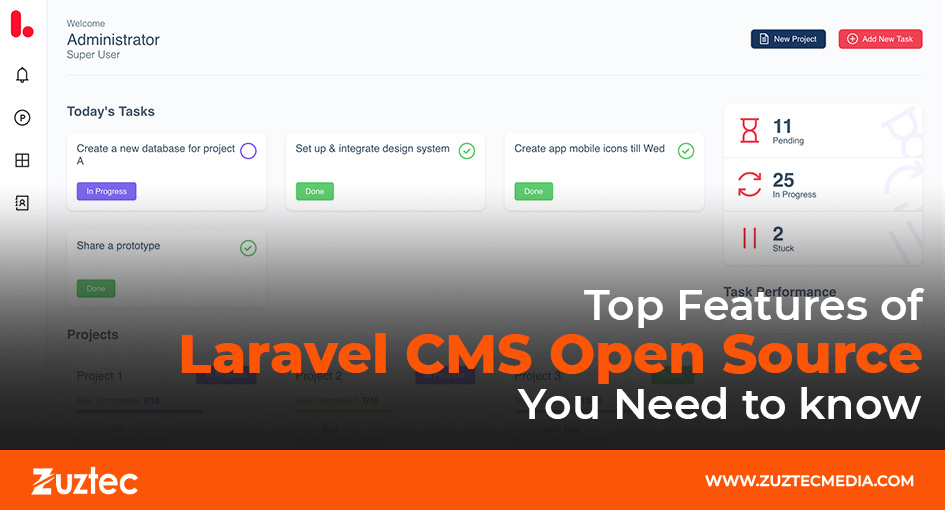
Top Features of Laravel CMS Open Source You Need to Know
In today’s fast-paced digital world, content management systems (CMS) have become the backbone of most websites. They empower businesses, content creators, and developers to easily create, manage, and update content without the need for deep technical expertise. A good CMS enables smooth, efficient website operation, even for users with minimal coding experience. Among the numerous CMS options available, Laravel CMS open source platforms have gained significant popularity due to their flexibility, scalability, and developer-friendly nature. Laravel, a powerful PHP framework known for its elegant syntax and robust set of features, has spawned several open-source CMS platforms that offer a wide range of customizable solutions to build feature-rich, dynamic websites.
For developers and businesses looking for a CMS that combines power, simplicity, and ease of use, Laravel CMS platforms stand out as an excellent choice. These platforms are built on the Laravel framework, which offers a clean, structured, and highly organized codebase that simplifies website development, maintenance, and future updates. Laravel CMS platforms are not only highly customizable but also provide a level of efficiency and performance that make them ideal for projects of all sizes. In this article, we’ll dive into the top features of Laravel CMS open source, exploring how they enhance content management, improve security, and offer customization options, all of which contribute to a superior web development experience.
1. Laravel CMS Open Source: Easy Installation and Setup
One of the first things developers appreciate about Laravel CMS platforms is the ease of installation and setup. Laravel’s clear and well-documented installation process, combined with the simplicity of open-source CMS systems built on it, ensures that developers can get up and running quickly. Most Laravel-based CMS solutions come with a one-click installer or a straightforward composer-based setup, making it easy for developers to deploy websites without complicated configurations. With pre-configured environments and automatic database setups, developers can focus on building the core features of the website rather than spending time on initial configurations.
2. Flexibility and Customization
Laravel CMS open-source platforms are highly flexible and customizable, making them ideal for a wide range of projects. Developers can easily modify the platform to suit the unique needs of their business or client. Whether you’re building a small blog, a corporate website, or an e-commerce platform, Laravel-based CMS allows developers to tailor every aspect of the system to meet specific requirements.
The modular architecture of Laravel also makes it easy to extend CMS functionalities with custom plugins, themes, and third-party integrations. This flexibility allows businesses to scale their websites over time, adding new features and functionalities as their needs evolve. With a Laravel CMS open-source system, developers can create a truly personalized experience for both the backend and frontend of the website.
3. User-Friendly Admin Interface
Although Laravel CMS platforms are developer-centric, many come with intuitive and user-friendly admin interfaces that make content management easier for non-technical users. The administrative dashboards are designed to be simple and straightforward, allowing users to manage their content effortlessly. Features like drag-and-drop content management, real-time previews, and easy-to-navigate navigation menus ensure that even users with little technical knowledge can update and manage content on the site.
Moreover, Laravel CMS open source platforms often come with built-in WYSIWYG (What You See Is What You Get) editors, so users can format text, insert images, and manage multimedia content without needing to understand HTML or CSS. This reduces the barrier to entry for content editors and allows teams to maintain and update the website independently.
4. Strong Security Features
Laravel, a popular CMS platform, offers robust security features against common vulnerabilities like SQL injection, XSS, and CSRF. Its built-in tools for password hashing, encryption, and authentication, along with regular updates and patches, make it a reliable choice for businesses prioritizing data protection.
5. Scalability
Scalability is another standout feature of Laravel CMS open source platforms. The needs of websites change as organizations expand, and Laravel is made to scale with ease. Whether you’re handling a sudden increase in website traffic or adding new features, Laravel’s underlying architecture ensures that your CMS can scale to meet those demands.
Laravel CMS platforms offer features like database migrations, caching, and optimized routing, all of which contribute to improving the performance and scalability of websites. Laravel also supports various cloud-based infrastructure options, including AWS and DigitalOcean, allowing businesses to deploy their CMS solutions on scalable environments that grow as they do.
8. Community Support and Documentation
Since Laravel CMS open source platforms are built on the Laravel framework, they benefit from the extensive support and documentation available within the Laravel community. The open-source nature of the platform means that developers can access a wealth of resources, including tutorials, forums, and GitHub repositories, to help them resolve issues and find solutions to common problems.
Anyone working with a Laravel-based CMS can access a multitude of shared knowledge thanks to the active and robust Laravel community. Whether you’re troubleshooting an issue or looking for a custom plugin, the community can be an invaluable resource.
In conclusion, Laravel CMS open source platforms combine the power, flexibility, and security of the Laravel framework with the simplicity of content management. With features like easy installation, user-friendly admin interfaces, robust security, scalability, and SEO tools, they offer a comprehensive solution for developers and businesses looking to create custom, high-performance websites. Whether you’re building a simple blog or a large-scale e-commerce platform, Laravel CMS gives you the flexibility and control to bring your website vision to life. With its active community and continuous updates, Laravel remains one of the best choices for developers building open-source content management systems.

